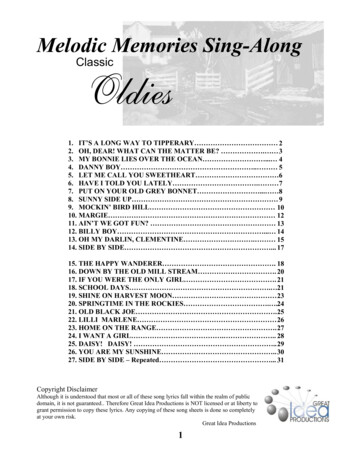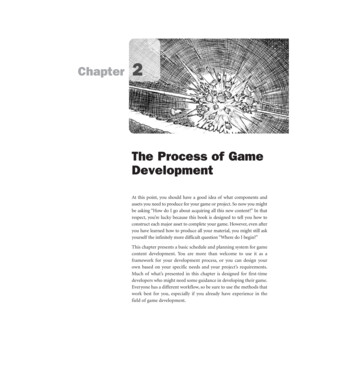
Transcription
“We Have Come a LongWays We Have aWays to Go”Col. Dwayne Wagner, U.S. Army, RetiredDuring the Civil War, Frederick Douglass used his stature asthe most prominent African American social reformer, orator,writer and abolitionist to recruit men of his race to volunteerfor the Union army. In his “Men of Color to Arms! Now orNever!” broadside, Douglass called on formerly enslaved mento “rise up in the dignity of our manhood and show by our ownright arms that we are worthy to be freemen.”—Farrell Evans, History.comLittle did Frederick Douglass know that BlackAmericans would continue to serve in everysubsequent war for America and return hometo face racism, bigotry, and second-class citizenship. So,when someone asks if the Army has changed regardingthe treatment of Black or African American soldiers, Ianswer this question using the same phrase my fatherused in the 1960s and 1970s: “We have come a long ways we have a ways to go.”After answering this question, the follow-onconversation typically is reflective of the person’srace. Black friends and associates spend more timetrying to convince me that “we have a very long way togo” as they focus on the glass that is half empty: personal encounters with racism or bias, discrimination,or statistics tied to selection rates for battalion andbrigade command or senior service college. My Whitecoworkers or lifetime friends reflect on legal andcultural changes since the 1960s and believe that theArmy “has come a very long way” in embracing BlackAmericans. Can both voices be right?Each voice than asks, “How do we know when weare?” Let me use my journey since 1956 to try to respond2to both voices. As an Army officer (1978–2008), an Armycivilian (2008–2021), and the son of a soldier (19561978), I have sixty-four years of watching Army racerelations morph, sometimes forced by society and othertimes leading social change due to our Army values.The 1950s: The Cold Warand Desegregation“President Harry S. Truman signed an executive orderin 1948 ending segregation in the military and in the federal workforce. Executive Order 9981 said, ‘There shall beequality of treatment and opportunity for all persons inthe armed services without regard to race, color, religionor national origin.’ Truman’s support of civil rights wasan abrupt change from his early thoughts on the blackcommunity, as shown by many of his letters to friendsand family that used racist language. He later changed hisways, writing a friend to say, ‘I am not asking for socialequality, because no such thing exists, but I am asking forequality of opportunity for all human beings and, as longas I stay here, I am going to continue that fight.”’1While Truman was struggling with decisions of race,my grandfather and father worked as sharecroppers inEast Texas amid the virulent racism of the 1930s and1940s. My father left sharecropping at the age of nineteenand joined the Army in 1949 because he had no otheroptions as a poor African American man during this era.Our family land that belonged to his grandfather wasstolen by Whites who used a rigged tax system to stealland from Black landowners. This was an institutionalized practice in the early 1900s through the 1950s, andsome remnants remain today. The U.S. Department ofAgriculture continues to address historical institutionalMilitary Review Online Exlusive · June 2021 MILITARY REVIEW
LONG WAYS TO GO(Graphic by Stephen Breen, San Diego Union Tribune. Used with permission)racism’s impact on Black farmers today by establishinga program designed to compensate for historical discrimination. The Outreach and Assistance for SociallyDisadvantaged and Veteran Farmers and RanchersProgram is part of the American Rescue Plan Act of2021 and specifically includes Black farmers or familiespenalized by earlier institutional discrimination.My father was later shipped off to Korea as an infantryman. The timing of his arrival (1950) dovetailed withTruman’s executive order. My father integrated an allWhite infantry regiment that was engaged in combat operations. His stories include (1) the company commanderinitially refusing to shake his hand, (2) the burning of hispersonal tent and belongings, and (3) the White soldierswho embraced him as an equal. So, through the prismof my grandfather and father—and Truman’s executiveMILITARY REVIEWMilitary Review Online Exlusive · June 2021order—“race relations had come a long ways.” Yet, in 1951,my father returned to an America that treated him as asecond-class citizen: back of the bus; enter through theback door; housing redlining, employment discrimination; and do not make eye contact with a White man orargue with him in public. In 1951, we had an exceptionally long way to go in achieving racial equality within ourNation and the Army (a reflection of American society).The 1960s: Vietnam andthe Civil Rights MovementFrom a legal standpoint, the 1960s marked atransformation of the realities of discrimination andpolitical equality for Black people with the passingof the Civil Rights and Voting Rights Act (1964and 1965, respectively). The 1960s also marked the3
full engagement of the United States in the war inVietnam. In support of this campaign to upholddemocracy, Black soldiers continued the tradition ofserving the Army with distinction.2During the 1960s, we traveled from the West Coastto the South or from several points to Texas. We wouldstop at a gas station, my father would go inside andreturn, and we would depart without buying gas. Atthe time, I did not understand. Years later, I learnedthat my father would ask if he could use the restroom.If the attendant said no, my dad was not going to buygas and give them money. As a military family member,I learned to only give money or business to people whotreated me with dignity and respect.The 1970s: Post-Vietnam andthe Post-Civil Rights EraSince its establishment in 1971, theCongressional Black Caucus (CBC) has beencommitted to using the full Constitutionalpower, statutory authority, and financial4Staff Sgt. Lucious Wagner, the author’s father, talks on a desk phonecirca 1950s while stationed at Kaiserslautern, Germany. (Photo courtesy of the author)resources of the federal government toensure that African Americans and othermarginalized communities in the UnitedStates have the opportunity to achieve theAmerican Dream. The Caucus is chaired byCongresswoman Joyce Beatty. As part of thiscommitment, the CBC has fought for thepast 48 years to empower these citizens andaddress their legislative concerns by pursuinga policy agenda that includes but is not limited to the following:reforming the criminal justice system andeliminating barriers to reentry;combatting voter suppression;expanding access to education from pre-kthrough level; Military Review Online Exlusive · June 2021 MILITARY REVIEW
LONG WAYS TO GO expanding access to quality, affordablehealth care and eliminating racial healthdisparities;expanding access to technologies,including broadband;strengthening protections for workers andexpanding access to full, fairly-compensated employment;expanding access to capital, contracts,and counseling for minority-ownedbusinesses; andpromoting U.S. foreign policy initiativesin Africa and other countries that areconsistent 3America was transitioning from a decade of civilrights when my father retired from the Army in 1970at Fort Benjamin Harrison, Indiana, where he taughtfinance policy and procedures to second lieutenants. Thisman who integrated an all-White regiment in 1950 wasnow teaching White officers in 1970, and he was evaluating them. Toward the end of his military career, he hadtransitioned to loving America, warts and all, becausehe was seeing progress. My father prepared to move usfrom a relatively integrated military environment to theall-Black neighborhood of Oak Cliff in Dallas.My family moved to Dallas in 1970. We lived in subsidized housing, received food stamps, and my dadattended college part time and worked two part-time jobswhile raising six children. The six children later attendedcollege (five lived at home), thanks to aid from the federalgovernment and the state of Texas. Each became a futuretaxpayer. I learned that government has a role in providing short-term bootstraps for poorer Americans. My highschool was over 90 percent White before busing and over90 percent Black after busing. The Whites moved furtherout in the suburbs instead of attending school with meand other Blacks. I then learned that many Whites didnot want to associate with me, an eye-opening discovery for me because of our military background. Iwas in high school Junior Reserved Officers’ TrainingCorps (JROTC) from 1970 to 1974. Our senior naval professor of military science was a White retired naval officer working in an almost all-Black high school.He cared about us, treated me with dignity and respect,and was willing to admit that my journey would be harder based on race alone.I attended the lowest academically ranked high schoolin the state of Texas. In my junior year, despite my SATscores and my 3.8 grade point average, my counselor toldme to join the Army because I was not college material. She did not talk to me about junior college or tradeschool. At the time, I was naïve and impressionable,and I agreed with her; my father did not. My JROTCinstructor urged me to live at home and attend a localcollege. Since my father was already a student at BishopCollege, this made sense. I learned that my high schoolpreparation would possibly be challenged based on scoreson standardized tests. The two only White influencers inmy life, my counselor and my Navy JROTC instructor,disagreed on my potential. The counselor did not see college in my future. My instructor did. After graduating, Iwondered if she stereotyped me or honestly believed thatthe SAT score was accurate.Book cover of Escape from the Texas Cotton Fields depicting the author’s aunts and uncles in a cotton field in East Texas circa the late1940s. King Solomon Wagner, the author’s uncle, died in 2018. (Photocourtesy of the author)MILITARY REVIEWMilitary Review Online Exlusive · June 20215
I later matriculated at Bishop College, excelled inROTC, and was elected student body president mysenior year. I learned that an all-Black educationalenvironment could nurture and inspire an academically disadvantaged Black student. While attendingBishop College, my ROTC professors, four graduatesof HBCUs (historically Black colleges and universities),graduates. I learned again that some would use my educational credentials against me.Circa 1983, I attended a nine-week militaryschool, and my instructor (an armor lieutenant colonel)and I bonded. Lt. Col. Joseph T. Snow (now deceased) invested in me and talked openly about racism in the Army.As a White officer, he was witness to some of the blatantBattalion command helped me understand that theArmy was becoming less race conscious, while societycontinued to lag.told me to attend a primarily White university for mygraduate degree because my White Army bosses woulddiscount my HBCU college education. I started myArmy journey with imposter syndrome.1980s: A Decade of Reorganizationand Cold War AdventuresMeanwhile, civil-rights leaders like Martin LutherKing Jr. and public figures like Mohammed Ali madethe case that Vietnam was an example of a “race war” inwhich the White U.S. establishment is using colored mercenaries to murder brown-skinned freedom fighters. Onthe other side, there were men like Staff Sgt. Glide BrownJr., exemplars of the fact that Vietnam was the first trulyintegrated conflict in U.S. military history. He was Black,the men he commanded were not, and that did not seemto matter. Though African American fighters had defended the United States since the earliest days of the Nation,and the military had officially been desegregated in the1940s, segregation was still largely in practice in Korea.For the men to whom Time spoke, the numbers, whichcould also be read as the Black man taking the brunt ofthe war’s burden, were evidence of inroads being made.4In 1981, while serving as a lieutenant at Fort Sill,Oklahoma, my boss, thinking he was complimenting meduring a counseling, said, “Dwayne, as well as you write,it is obvious you did not attend a HBCU.” I replied,“Sir, Bishop College had 999 Black students and aboutfifteen internationals. It is a HBCU.” This former WestPoint English professor turned red in the face. He knewthat I knew he harbored some bias regarding HBCU6and undercover racism. In 1985, he called and told me toapply for graduate school. I did. I was selected for a fullyfunded program and spent fifteen months at a primarilyWhite university earning a master’s degree through aprocess that included a thesis, oral comprehensives, andwritten comprehensives. In October 2000, he attendedmy promotion ceremony to colonel. Snow was one of mymentors from 1985 until his death four years ago. I learnedthat my mentors would not always look like me.From 1983 to 1986, I served at Fort Riley, Kansas. Mycommanders were outstanding: competent, fair, progressive. Both treated me with dignity and respect. I cannotsay the same about the local Army Criminal InvestigationDivision (CID), who used a minor investigation of oneof my sergeants to go after me for dereliction of duty. Mycommander and others were convinced that my raceinfluenced the decision to charge me. Luckily, and thanksto my chain of command and senior leaders at CID headquarters, I was “taken out of the title block,” which effectively meant that CID recognized that the local office andthe staff judge advocate made the wrong decision. Then,during the last three decades, and now, I am convincedthat unconscious bias on part of the CID commander ledto a very unusual decision to place a company commander in the title block for an administrative oversight.My time in Kansas was mostly good, yet there weremoments. I went to Manhattan, Kansas, to buy a car. Thesalesman said, “I have to call your first sergeant to makesure you are a good soldier.” Remember, I am an Armycaptain, in command of a company of 165 solders. Duringthe phone call, I hear the voice on the other end yell, “WhyMilitary Review Online Exlusive · June 2021 MILITARY REVIEW
LONG WAYS TO GOare you calling me about my company commander?”The red-faced salesman says to me, “Why didn’t you tellme you were a captain?” I replied, “Why did you assumeI required vetting from a first sergeant?” I asked for themanager, who quickly apologized for his salesman. I didnot buy from them. Several months later, while visiting adining facility on a Saturday morning in civilian clothes,the sergeant pushed my money back and said, “Only officers pay surcharge.” I then pulled out my ID card and said,“Sergeant, why would you think I am not an officer?” Heknew I knew that he stereotyped me. Again, I learned thatsome people used my race to label me.In 1986, we moved to Huntsville, Texas. The Armygave me fifteen months to complete a fully funded graduate program at Sam Houston State University, knownfor its criminal justice and corrections programs. Living inHuntsville allowed me to re-see Texas, as I had been awayfor nine years. The school treated me well. My professorswere great. Not so much the town. The following occurred while living in Huntsville from 1985 to 1986:I am cutting my lawn, and a car stops and the Whitedriver says, “My yard is about the same size, whatyou charge?” I reply, “I live here.” The man drives off.My wife Edna answers the door. The man says, “Isthe lady of the house in?” Edna says, “Who?” Theman says, “Is the homeowner in?” Edna replies, “I livehere.” The man walks away.I need to take a taxi home from downtownHuntsville. The Black cab driver gets my addressand says, “Are you sure the address is right? Wedon’t live in that neighborhood.” As he dropped meoff, he said, “Be careful brother, we ain’t supposedto live here.”Two months later, my lease was invalidated dueto the homeowner not approving the contractI signed with the real estate company. We selfmoved to an apartment. Others believe the ownerlearned that we were Black.My graduate school assignment reminded me of thehistorical racism in Texas and that my job status, education, and socioeconomic position meant nothing. Tomany locals, I was just another “N-word,” a word I heardseveral times and pretended to not hear. The Armythen sent me to the Mannheim Correctional Facility(Germany) for a graduate school payback tour of threeyears. From 1987 to 1990, I worked for two leaders(Monte Pickens and Joel Dickson) and met a third, Peter MILITARY REVIEWMilitary Review Online Exlusive · June 2021Hoffman, who would influence my career, both shortterm and long term, in only positive ways. Lt. Col. Pickensordered me to teach a college class to improve my briefingability. I thought he was an ass. I later learned that hecared about me and was preparing me for my future.Hoffman later brought me to the Pentagon, taught mehow to be an Army headquarters staff officer (with theaid of Bruce Conover), and later eased my move to one ofthe most prestigious jobs for a military police major: fieldgrade assignment officer, Army Personnel Command.Again, I learned that my mentors and sponsors could befair-minded White men who treated all well.The 1990s: Operation Desert Stormand Army DownsizingWhen the Army deployed for the Persian Gulf Warin 1990, African Americans constituted 29.06 percentof the active force. As part of its efforts to rebuild afterVietnam, the service had made a strong commitment toequal opportunity. Much of the Army’s success duringthe war was the result of this commitment, the recruitment of high-quality personnel, better training methods,and a renewed emphasis on the importance and prestige of the noncommissioned officer corps. Leading themilitary during this war was the Army’s second AfricanAmerican four-star officer and the first Black chairman of the Joint Chiefs of Staff, Gen. Colin L. Powell.Four years after the warended, Sgt. Maj. Gene C.Col. Dwayne Wagner,McKinney was sworn in asU.S. Army, retired,the first African Americanis an assistant professor atSergeant Major of thethe U.S. Army CommandArmy. Unfortunately,and General Staffhis tenure was cut shortCollege (CGSC) at Fortby allegations of sexualLeavenworth, Kansas. Hemisconduct and his conholds a BA from Bishopviction at court-martialCollege and an MAfor attempting to obstructfrom Sam Houston Statethe investigation into thoseUniversity. Wagner comallegations.5manded the 705th MilitaryWhile at the ArmyPolice Battalion and servedPersonnel Command,as a Senior Service CollegeI managed 636 officers:Fellow at the School oflieutenant colonels andAdvanced Military Studies.majors. During a comIn 2018, he was selected asmanders’ conferencethe CGSC Civilian Educatorattended by colonels andof the Year.7
Company commanders from the 705th Military Police Battalion (from left to right), Capt. Laura Eckler Cook, Capt. Sheila Lydon, Capt. Eric Barras,Capt. Kolette Trawick, join then Lt. Col. Dwayne Wagner (seated) for a photo circa 1996 at Fort Leavenworth, Kansas. (Photo by Edna Wagner)lieutenant colonels, I provided a field grade update.When the diversity slide was presented, I said, “Duringmy first six months, none of you have made a by-namerequest for a Black or female officer.” I continued andconcluded the brief. At the break, I was surrounded bycolonels asking me if I were calling them “racist.” I responded that minority officers needed mentorship andthe right jobs for development for battalion command.I later learned that I had ruffled some feathers, and Idid not care. Senior leaders like Herb Tillery, Bill Hart,Larry Haynes, Sharie Russell, and others had taught methat diversity was important.Later, while working in a different personnel job, I wasadvised that the incoming one-star general was biasedagainst Black officers, and I would not fare well. This one8star was demanding, rough, and did not suffer fools well.A year later, he top blocked me on an annual evaluation,gave me a general officer potential comment on the evaluation report, and placed me among his top lieutenantcolonels. I learned to be leery of “he is a racist” rumorsand to give each person a chance.I still remember the day when the director of theOfficer Personnel Management Directorate, a Whitebrigadier general, chaired a meeting with the field gradeassignment officers. We were responsible for managingthe careers of Army majors and lieutenant colonels.There were about thirty-five of us, supposedly the creamof the crop as we represented our branches and functional areas. There were two Black officers in the room: a fieldartillery major who would retire as a lieutenant generalMilitary Review Online Exlusive · June 2021 MILITARY REVIEW
LONG WAYS TO GOand me. When the general got to promotion selectionrates, he said, and I paraphrase:Black officers have suffered through generational, institutional, and personal racism. Somemore than others. The SECARMY [secretaryof the Army] and the CSA [chief of staff of theArmy] are always going to first check to see theselection rate for Black officers. If we sense ourBlack officers are being treated fairly, we knowall are being treated fairly. Black officers are the“canary in the mine shaft.”The heads nodded up and down and my peers understood. They saw all the files. About half of them “gotit.” The other half assumed that the system was fair,and we needed better Black officers. Society is (sometimes) judged by how it treats African Americans.The canary is slowly dying.The Army knew that racial discrimination was a factor. We had come a long way, yet we had a way to go.people in the battalion who served with you at Fort Sill,Mannheim, and the Pentagon, and I only heard that youwould be a good commander. Sir, race relations are improving when NCOs [noncommissioned officers] focuson the man, and not his race.”A year into command, a soldier brought his parentsto my office to see me. The mother walks in and hugsmy command sergeant major (CSM) and says, “ColonelWagner, my son says you are a great commander.” MyCSM, who is red-faced, points at me and says, “I am thesergeant major. HE is our commander.” The mom walksover and shakes my hand. No hug. After pleasantries,they left. Later that evening, the soldier returned, andapologized for his mother. I said, “You did not tell yourmother that I was the Black man in the room or that I amBlack.” The soldier said, “Sir, you are not Black. You aremy commander.” Battalion command helped me understand that the Army was becoming less race conscious,while society continued to lag.705th Military Police Battalion,1996–1998The 2000s: 9/11 and the GlobalWar on TerrorismIn 1996, I took command of the 705th Military PoliceBattalion at Fort Leavenworth, Kansas, and was the firstBlack officer to do so. This was less significant becauseAfrican Americans had been commanding battalionsfor decades, albeit at lower selection rates. My fatherate breakfast at Pullman’s Restaurant in downtownLeavenworth on the morning of the change-of-commandceremony. Two tables away sat four local farmers. My dadsaid they were talking about the “Black lieutenant coloneltaking command of the MPs [military police] and if hewas qualified to do so.” My father ate his breakfast and remained silent and thought about his time in Korea (1950)and Vietnam (1968). He said nothing to the men. Threehours later, after the ceremony, he shared their commentswith me. He believed that the Army had come a longway, since his son took command of a racially integratedformation. That same morning, I walked from my houseto the ceremony. My mother-in-law, who was not familiarwith the Army, whispered to my wife. I later learned thatmy mother-in-law was surprised to see White soldierssalute me. She lived in Baton Rouge, Louisiana, and wasconditioned to be subservient to Whites.About six months into the command tour, my seniorenlisted advisor, a man from Alabama, said, “Sir, I didnot know you were Black until you arrived. We haveThe distribution of African Americans in the service by 2003 had developed in several unexpected ways.While the company grade officer percentage had risento roughly a proportionate level, the percentage of fieldgrade and general officers remained much lower. Moresurprisingly, the proportion of Black soldiers in combatspecialties had declined significantly by 2003. This was inpart due to the large numbers of Black women who hadentered the service, and who were barred from holdingsuch specialties. Other factors that have been suggestedfor this trend include higher Black unemployment ratesthat motivate Black males to select specialties that haveskills easily transferable to civilian jobs, and family traditions of service in such specialties. Another suggestedcause of this disparity is that a sizeable number of Whitemales join not for a career or to obtain a marketable skill,but rather for the adventure and challenge provided byenlistment in the combat arms before continuing on withtheir civilian education and careers.7In 1999, I was a lieutenant colonel, former battalioncommander, and senior service college selectee, and Iwas awaiting the results of the colonel’s list. By all accounts, I was a competent and capable officer. I was aninstructor at the Combined Arms Staff School at FortLeavenworth, and I taught a seminar made up of twelveMILITARY REVIEWMilitary Review Online Exlusive · June 20219
captains, many of whom had not commanded yet andwere learning how to be staff officers.Historically, a staff group would coordinate a farewellsocial the night before graduation. If the students likedand Staff School. All saw it as a testament to my ability toconnect with the captain and a need for the captain to unburden himself. In 1999, an Army captain struggled withfollowing a Black lieutenant colonel: we have a long wayRegardless of my audience or topic, I tried to providethe other voice or a perspective that the officer couldnot see, from my historical vantage point.their instructor, she or he would be invited. If the staffgroup did not like their instructor, she or he would notknow about the gathering.Circa March 1999, my graduating staff groupinvited me to their graduation party. All twelve captains attended. We ate appetizers and drank beer, andthey gave a gift to me and waxed eloquently about howmuch they learned during the six-week course. The vibewas positive. Incredibly positive. As the evening wounddown, only five captains were left, all White males, andnot uncommon at all.One of the officers looked at me, started crying,and said, “Sir, six weeks ago when you walked into theclassroom, I was disappointed, and I said to myself and, sir, please excuse my language ‘what is this f--king(N-word) going to teach me.’” The officer continued tocry. The four other captains were in shock and were waiting for my response. I said, “Go on.” The captain, throughsobs, said, “Sir, I judged you based solely on your race andduring the last six weeks I have learned more from youabout leadership than any other officer I know.”(Silence)The captain continued, “Sir, I am from Mississippi andmy parents are racist, and I have struggled since beingin the Army with accepting Blacks and this course hasopened my eyes with how much I need to change.”I said: “(John), it took guts for you to reveal yourselfto me in front of your classmates. I want you to confrontyour racism, reach out to others, and over time get better.”We then drank another beer and talked about life, Army,and world events. Later, two of the officers who witnessedthe event asked if they needed to write statements. I saidno. I saw the event as a life lesson for the captain.The following day, I shared the event with a couple ofpeers and the director of the Combined Arms Services10to go. In 1999, a White officer confronted his own racismand wanted to get better: we have come a long way.The 2010s: The Army andPost-Racial America?The Economist called it a post-racial triumph andwrote that Barack Obama seemed to embody the hopethat America could transcend its divisions. The NewYorker wrote of a post-racial generation and indeed,the battle-scarred veterans of the civil rights conflictof forty years ago seemed less enchanted with Obamathan those who were not yet alive then. Amb. AndrewYoung, a one-time aide to Martin Luther King, arguedthat former President Bill Clinton was every bit asblack as then Sen. Obama.8During the last twenty-one years, I was fortunate toserve as a colonel and sit on several selection boards, andas an Army civilian, to teach at a U.S. Army Commandand General Staff College (CGSC), interacting with thenext two generations of Army leaders. Both allowed meto observe change within the Army.From 2001 to 2008, while serving at the Pentagonand going in and out of Afghanistan, I spoke to hundreds of officers on many topics including race anddiversity. The conversations with White officers typically focused on how race relations and diversity haveimproved, with leaders providing personal vignettesof success stories. Conversely, my conversations withBlack officers focused on the relative lack of diversityor personal stories of racism, bigotry, discrimination,conscious bias, or unconscious bias. Regardless of myaudience or topic, I tried to provide the other voice ora perspective that the officer could not see, from myhistorical vantage point. Too many White officers wantto believe that the Army is post-racial, and we are allMilitary Review Online Exlusive · June 2021 MILITARY REVIEW
LONG WAYS TO GOgreen. Well, we are light-green and dark green. Toomany Black officers sometimes look for racism and biaswhere it does not exist. We wake up in the morning, expecting to be treated differently, lesser. Well, sometimeswe are treated with disrespect based on racism or bias.Is there still a vestige or vestiges of institutionalracism in the Army? Or are we seein
scores and my 3.8 grade point average, my counselor told me to join the Army because I was not college materi - al. She did not talk to me about junior college or trade school. At the time, I was naïve and impressionable, and I agreed with her; my father did not. My JROTC instru











